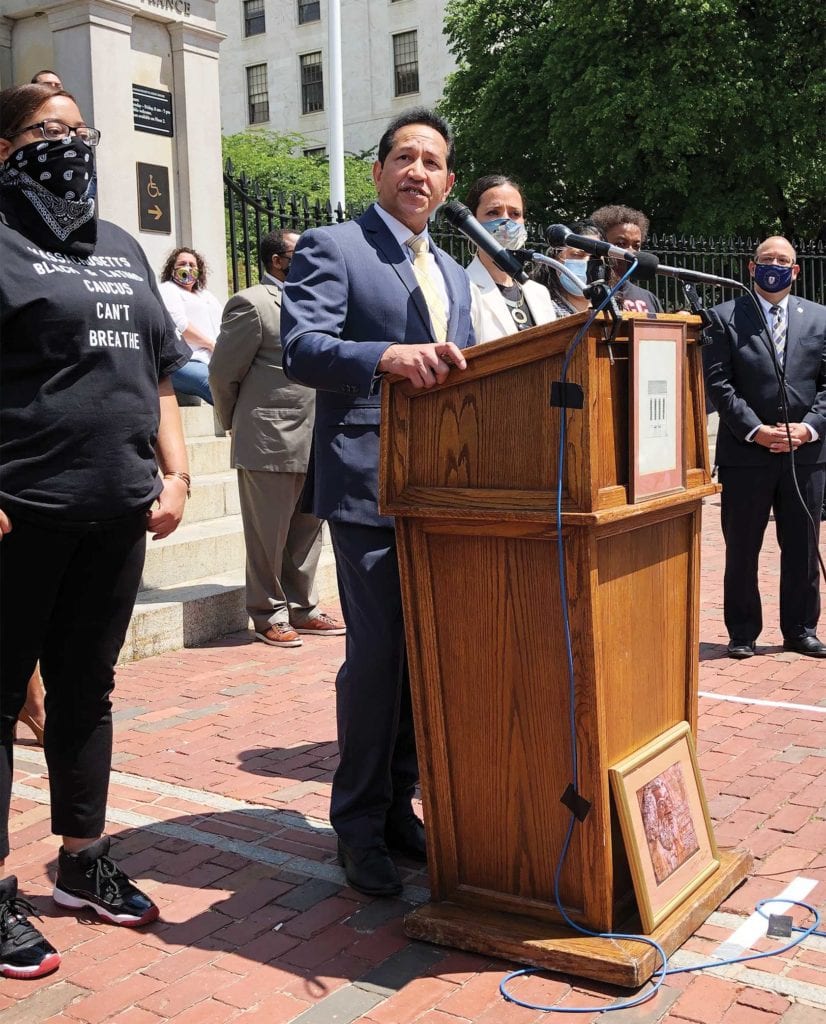Black, Latino officials call for police reforms
Elected officials seek movement on long-stalled reform initiatives

Members of the Massachusetts Black and Latino Legislative Caucus, along with U.S. Rep. Ayanna Pressley, gathered on the steps of the State House June 2 to advocate for police reform in the wake of George Floyd’s murder. The press conference began with eight minutes and 46 seconds of silence — the same length of time that Floyd was pinned down by Minneapolis Police Officer Derek Chauvin, unable to breathe, until he lost consciousness and died.
“For too long, black and brown bodies have been profiled, surveilled, policed, lynched, choked, brutalized and murdered at the hands of police officers,” said Pressley. “We cannot allow these fatal injustices to go unchecked any longer.”
Pressley, Massachusetts’ first black congresswoman, said that injustice and systemic racism has been “codified in law.” She said that the legislation needs to be “precise and prescriptive” to codify healing and justice instead.
“Congress must act in this moment as the conscience of our nation,” she said. “That’s why Representative [Ilhan] Omar and I have introduced a resolution to make clear that this congress stands on the side of racial justice, and ensure that those responsible are held accountable.”
Members of the caucus introduced a 10-point reform plan that encompasses the federal, state and municipal level. Pressley’s resolution calls on the House to condemn police brutality, racial profiling and excessive use of force. It aims at increasing oversight and independent investigations to hold individual officers accountable.
The resolution also calls on the Department of Justice to reassert its statutory authority to investigate and litigate instances of profiling and brutality. Pressley advocated for uniform restrictions on use of force and the elimination of special protections that shield officers from accountability.
Pressley said that 1999 marked the last time a resolution on police brutality was introduced to the House. The resolution by Rep. Danny Davis of Illinois never made it to the floor. She said she “couldn’t even begin to approximate how many black lives we’ve been robbed of in that time.”
The pain of black and brown Americans has always been “delegitimized,” she said. COVID-19’s death toll is only one example. The pandemic has disproportionately affected communities of color because health disparities are often ignored.
“We have the pain of the brutalization and the murder of black and brown folks because our pain has been delegitimized,” she added. “Our trauma, our suffering, the injustice of it all.”
At the state level, Massachusetts Black and Latino Legislative Caucus Chairman Carlos Gonzalez advocated for the passage of four bills. The first bill, introduced by Reps. Russell Holmes and David Vieira, would create a special commission on Peace Officer Standards and Training (POST) to ensure officers are following protocol on police conduct and cultural competency. The ACLU has reported that Massachusetts is one out of only six states without some kind of system to license police officers.
Two other bills, also filed by Holmes, would create an Office of Diversity and Equal Opportunity and a commission to study the systemic presence of institutional racism.
Holmes is the longest-serving state representative of color in Massachusetts’ State House. He said that the caucus has been advocating for changes for several years, but “no one listened.”
“It is awful, awful, that it takes a video of that nature to make it so that folks wake up and understand something we have known in our communities forever,” he said.
The fourth bill, drafted by Rep. Liz Miranda, aims at limiting police force, including deadly tactics like chokeholds. It also requires all departments to collect race data on individuals who are subject to police force or arrest. A national organization called “Mapping Police Violence” reported that black individuals are 3 times more likely than whites to be killed by police but 1.3 times more likely to be unarmed.
Gonzalez said that police units across the state must reflect the racial and ethnic diversity of the community they serve. He called on the House for the appointment of an independent special prosecutor in cases of police misconduct and advocated for the use of body cameras.
Gonzalez said that “rhetoric without change” cannot be accepted.
“No longer can police brutality and excessive use of force go unattended and unaccountable,” he said. “We have been fighting this issue far too long.”
At the municipal level, Boston City Councilors also advocated for change. Their plan includes declaring racism a public health crisis and creating a civilian review board to investigate misconduct.
Council President Kim Janey recognized the “modern-day lynching” of Ahmaud Arbery, as well as Breonna Taylor’s and George Floyd’s murders.
“These are not isolated incidents,” she said. “What else could have resulted from a history steeped in centuries of violence against people of color in general and black people in particular?”
For generations, she said, black individuals have experienced a system that always finds new ways to devalue their lives. She used Boston’s racial wealth gap as an illustration — the median net worth for black families is $8, she noted.
“$8 is not an accident,” she said. “It is a product of a system of white supremacy built on a foundation of chattel slavery. A system deliberately and methodically crafted by the first colonists, institutionalized by the founding fathers and perfected by subsequent generations of lawmakers.”
Councilor Ricardo Arroyo teared up while recounting his own experience with police as a teenager. He was pulled over on his way home from Providence. An officer asked Arroyo if he was stupid. When he answered “No,” he was forced out of his car, searched and held at gunpoint. When the officer repeated his question, Arroyo answered “Yes” and was allowed to drive home.
“I don’t have a scar on me,” he said. “I didn’t have a bruise, but I have wounds that I’ll never lose. And I wish I could tell you that that was an outlier.”






